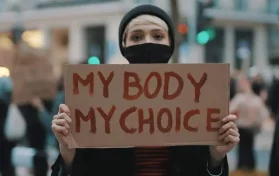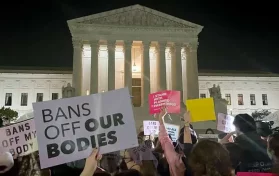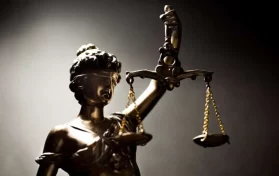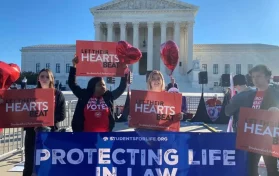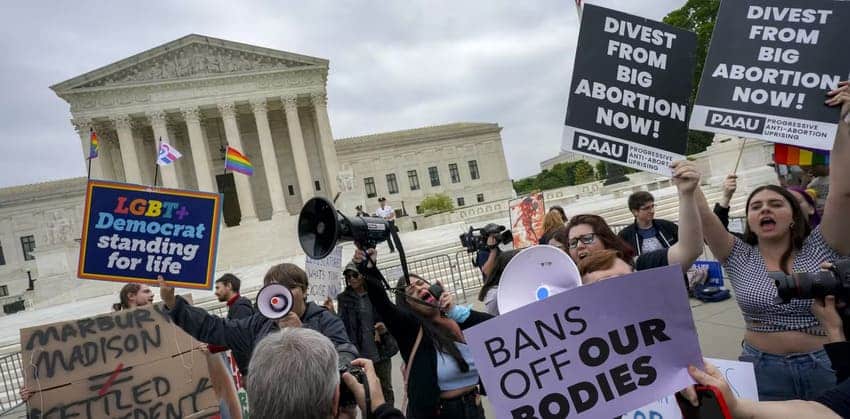
On Friday morning, the Supreme Court released its ruling on the Mississippi abortion case, Dobbs v. Jackson Women’s Health Center. In an unprecedented leak in early May, a draft opinion showed that the Court was leaning toward overturning Roe V. Wade. The Court made the ruling official, turning over the previous ruling. This will return the decision of abortion laws back to the states rather than outlaw abortion altogether.
The ruling held that in Mississippi’s case, the state law that forbids abortion after fifteen weeks does not infringe on a woman’s right to an abortion. The state’s attorney general had brought the law to the Supreme Court asking the Court to strike down a lower courts’ ruling that would have stopped the fifteen-week ban.
Justice Samuel Alito had written the draft opinion that was leaked previously. The final draft is also a statement by Alito: “We end this opinion where we began. Abortion presents a profound moral question. The Constitution does not prohibit the citizens from each State from regulating or prohibiting abortion. Roe and Casey arrogated that authority. We now overrule those decision and return that authority to the people and their elected representatives.”
Justices Sotomayor and Kagan wrote the dissenting opinion. They signed the opinion in joint. Part of their dissent read: “One result of today’s decision is certain: the curtailment of women’s rights and of their status as free and equal citizens.”
At least thirteen states have so-called trigger laws that are slated to take effect in the wake of Roe v. Wade being overturned. Those states include Arkansas, Mississippi, Idaho, Texas, Utah, Louisiana, Missouri, Tennessee, Kentucky, North Dakota, Oklahoma and Wyoming. South Dakota also has a trigger law. These trigger laws are written to outlaw abortion or provide certain restrictions in the event Roe v Wade was overturned.
It is unclear exactly when these trigger laws will take effect in every state, but many of them, including Kentucky, are slated to take effect immediately.
Alabama, West Virginia, Michigan, and Arizona all had laws in place that banned abortion before it was made legal across all fifty states in the 1970s. Legal experts expect those bans to become law once more now that Roe has been overturned.
The governors of both Michigan and Wisconsin, both Democrats, have already begun to push back on any ban. In April, Michigan Governor Gretchen Whitmer filed a lawsuit with the state’s Supreme Court that would stop any enforcement of a law put in place there in 1931. In Wisconsin, an 1849 law made abortion a felonious crime. He has also called for the state legislature to repeal the law.
If these bans and restrictions go into effect immediately, this morning’s decision would make abortion illegal in at least eighteen states.
Georgia, Iowa, and South Carolina as well as Ohio all have laws on their state’s books that ban abortions after the six week mark. Oklahoma just signed into law a similar law, with some exceptions. Those include danger to the life of the mother as well as cases of incest or rape that have been reported to law enforcement.
Some political pundits believe states such as Florida, Montana, Nebraska, and Indiana will further legislate abortions restrictions or outright bans based on their state’s most recent convocations.
The Guttmacher Institute believes that at least 26 of the states in the Union will have laws that ban abortions or place strict limits on the procedure. The states of California and Oregon, traditionally blue states, have moved to protect a woman’s ability to procure an abortion with minimal, if any, restrictions.
President Joe Biden is expected to make remarks later today regarding the ruling. President Obama has already commented on the ruling, while President Trump said that the ruling “will work out for everybody.”
Major networks such as ABC are warning there will be violence in the wake of the decision; specifically, they warn that abortion clinics will be attacked.


